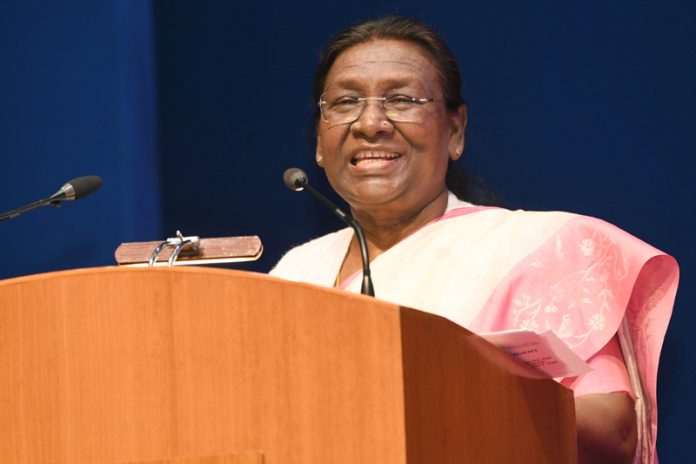
‘Make justice accessible for all’
NEW DELHI, Nov 26:
President Droupadi Murmu today suggested the creation of an All-India Judicial Service to select brilliant youngsters and nurture their talents from lower to higher levels in judiciary.
Addressing the Constitution Day celebrations organised by the Supreme Court of India here, the President highlighted that “cost” and “language” act as barriers for citizens seeking justice, and said that the overall system needs to be made citizen-centric in order to improve the access to justice.
Murmu said that the place of the judiciary, which has been welcoming diversity with open arms, in the Constitutional framework remains “rather unique” and that a “more varied representation of India’s unique diversity on bench and bar definitely helps serve the cause of justice better”.
“One way to hasten this diversification process can be the creation of a system in which judges can be recruited from varied backgrounds through a process which is merit based, competitive and transparent.
“There can be an All-India Judicial Service which can select brilliant youngsters and nurture and promote their talents from lower levels to higher levels,” she said.
Those who aspire to serve the bench can be selected from across the country to create a larger pool of talent, the president said.
“Such a system can offer opportunities to the less-represented social groups too. I leave it to your wisdom to devise any effective mechanism that you deem fit to achieve this objective of strengthening the justice delivery system,” Murmu said addressing the event.
Chief Justice of India Justice D Y Chandrachud, Judges of the Apex Court and High Courts also attended the event.
November 26 is observed as Constitution Day to commemorate the adoption of the Constitution of India by the Constituent Assembly in 1949.
The President said that there should be more efforts to ensure talented children in higher learning institutions get into the judiciary easily.
“After becoming the President, I get to visit many Central and State Universities, IITs, and IIMs among others. I need to go to many institutions. I am very fortunate as I interact with the children there. They are very talented. I sometimes ask them what they want to become. Some say IAS, IPS (officers) and others say they want to get into judiciary. Something needs to be done so that they get to come here (judiciary) easily,” the President said.
She said the cause of justice is best served by making it accessible for all, which also strengthens equality.
“We should ask ourselves, especially on occasions like today’s, whether every single citizen is in a position to seek justice. On introspection, we realise that there are many barriers in the way. Cost is, of course, the most significant factor. It is a matter close to my heart. That is why I appreciate all the initiatives taken by the Supreme Court in particular and the judiciary in general to expand the scope of free legal aid,” Murmu said.
“For example, language, which is beyond the comprehension of a majority of citizens. I feel reassured by the recent steps taken by the Supreme Court to make verdicts available in various Indian languages. The live webcast of court proceedings too will go a long way in making citizens true stakeholders of the judicial system,” she said.
Referring to mythological “bell of justice” stories, in which a king had installed a bell that any citizen seeking justice could ring at any time of the day, the president said, “When I heard such stories as a child, I wondered if the king would have any peace of mind at all, with people clamouring for his attention all the time.
“Later, I realised that such a king would have made the justice delivery system so efficient that the bell would need to be rung only rarely. Therefore, in order to improve access to justice we should seek to make the overall system citizen-centric,” Murmu said.
She said “our systems” have been products of colonialism and clearing away its vestiges has been a work in progress.
“I am sure that we can speed up the remaining part of de-colonisation in all domains with more conscious efforts. I believe involving the young generation in those efforts, by making them more knowledgeable of the Constitution — its making and its working — will bear excellent fruits in that direction,” the President said.
Murmu said the Constitution is only a written document and it comes alive and remains alive only if its contents are put into practice.
“That requires the exercise of interpretation. I must congratulate the Supreme Court for playing the role of the final interpreter of our founding document to the perfection,” she said.
Murmu said India has had people from highly varied backgrounds occupying high offices and excelling in various walks of life, thus deepening the democracy ever since it won freedom.
She said in the bureaucracy, armed forces as well as scientific and technological research institutions, women’s representation has been rising.
“This is true not only for women but also for other socially disadvantaged groups including Scheduled Castes and Scheduled Tribes. While the place of the judiciary in the Constitutional framework remains rather unique, I am confident that this institution too has been welcoming diversity with open arms,” Murmu said. (PTI)

